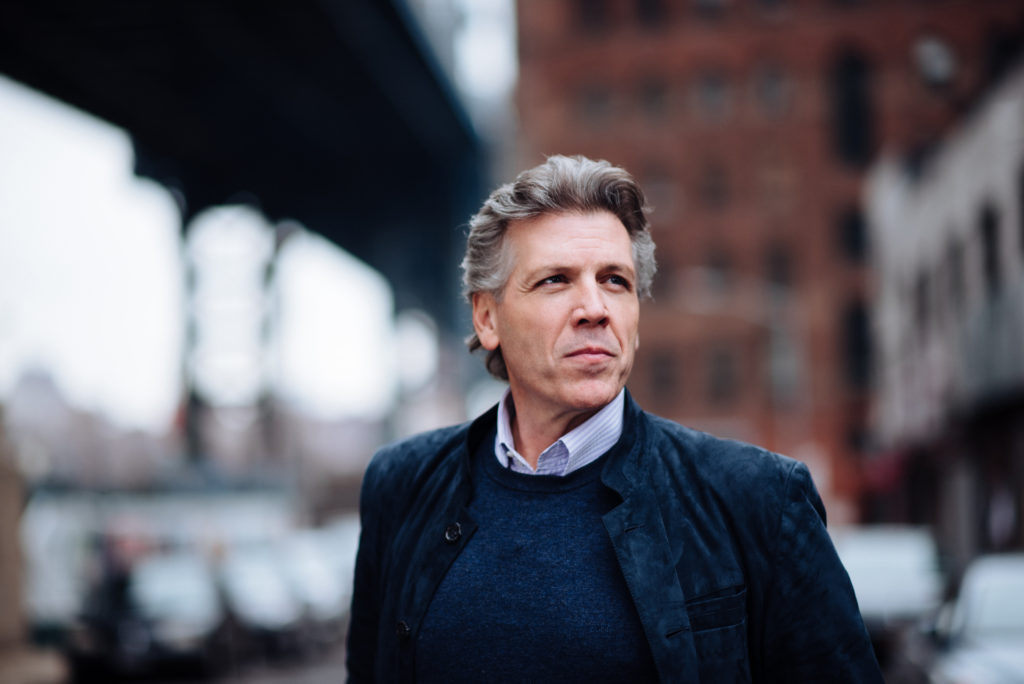Times Union: Tunes that have a national appeal

The European masters Schubert, Mahler, and Wolf figure heavily in most every season of concerts by the top baritone Thomas Hampson. In a typical year he travels the globe giving song recitals and performing with big orchestras and major opera companies. But Hampson doesn’t neglect the music of his homeland. An increasing part of his repertoire is devoted to American songs, from the 1700s to contemporary times.
On Aug. 19, Hampson will give an all-American program at the Glimmerglass Festival titled “Beyond Liberty.” More than a song recital, the event brings together poetry and narration plus accompaniment from an eight-piece ensemble.
“I love singing these songs and I’m going to continue until I drop or someone pulls me offstage with a hook,” says Hampson.
No one’s reaching for the hook.
Nine years ago at Tanglewood’s Ozawa Hall, Hampson gave a disarmingly beautiful American recital with pianist Craig Rutenberg. They opened with Francis Hopkinson’s “My Days Have Been So Wondrous Free,” which dates from 1759 and is said to be the first song written in America. From there, they covered works of Foster, MacDowell and Beach, surveyed numerous settings of Whitman, and touched on contemporary times with a recent work by Michael Daugherty. The second half was devoted entirely to Charles Ives. The pastoral setting in New England on a summer evening only added to the magic.
Any single recital only scratches the surface of the American repertoire that Hampson has been learning and embracing throughout his long career.
“From my earliest musical studies in Spokane, Washington, I learned to tell stories with music and poetry,” recalls Hampson. “That means Schuman, Schubert and Faure, but also American song. I took as colorful a bouquet of songs as you possibly could.”
Hampson notes the phrase “American songbook” usually refers to standards by the likes of Porter and Gershwin.
“My bailiwick is what we call ‘classic song’ or ‘art song,’ which is poetry set to music,” he explains. “It’s not a matter of quality but process. There’s so much creativity and it’s all part of our cantankerous, raucous, jocular American democracy.”
Hampson’s program for Glimmerglass marks the start of an ambitious new undertaking, also titled “Beyond Liberty,” that the baritone plans to perform in all 50 states within the next few years. He envisions a program that can be adapted as it travels to different parts of the country, wrapping in young singers, and showcasing music that tells the story of each region. The prototype will be on the boards at Glimmerglass next weekend.
“It should be a wonderful concert in itself, but also a construct that I can manipulate as we go around the country,” says Hampson.
The seeds for the project were planted a few years when Glimmerglass director Francesca Zambello heard Hampson perform a set of songs about the Civil War that were written specifically for him by Jennifer Higdon. He recalls Zambello remarking, “You could almost stage this.”
That put an idea in Hampson’s head.
“I always loved the Hal Holbrook/Mark Twain one-man show thing,” he says. “Perhaps there was some way we could do that in this context – a one-man show that lets me tell the stories as well as sing the songs.”
Hampson assembled a team that includes Zambello as stage director and the opera librettist Royce Vavrek as writer. “I’m a raconteur of American culture but we have to keep it in a stricter framework and Royce Vavrek has been on everyone’s lips, as an ambitious young writer and musician,” says Hampson. Among Vavrek’s many recent projects, he wrote the libretto for “Vinkensport, or the Finch Opera,” which recently played at Opera Saratoga. An eight-piece instrumental ensemble rounds out Hampson’s band of collaborators.
As for the music, Sunday’s lineup will include Stephen Foster’s “Beautiful Dreamer” among other 19th-century selections, several pieces by Ives, including the cowboy tune “Charlie Rutledge,” plus more recent works by Daugherty, Michael Tilson Thomas and John Corigliano.
Returning several times throughout the 90-minute program will be the familiar music we know as the national anthem. According to Hampson, long before 1931, the year that Congress declared “The Star Spangled Banner” as our national anthem, the tune was deployed with a wide variety of texts, often for political or satirical purposes.
“There are over 220 different broadsheets of various social contexts set to that tune in b-flat major,” explains Hampson. “Temperance, abolitionists, suffrage, and every other every social context picked it up. It was often raucous and foreboding with plenty of social finger-pointing.”
Such a slice of popular musicology may be fascinating, but Hampson emphasizes that his objective is less about music history and more appreciation of our common experience as Americans. He’s been singing these songs long enough to know how to best present them and what to expect from an audience.
“I feel the relationship to my public,” he says, “and the response to the recital is a kind of trepidation going in and a kind of celebration at the end. People say ‘That’s my story, my language. I know where that came from.'”
As for the title “Beyond Liberty,” Hampson says the “beyond” part is about people coming together in civility as neighbors and community. “The bedrock is tolerance and empathy. We don’t have to agree with everybody else but we can still buy them a cup of coffee, for crying out loud.”